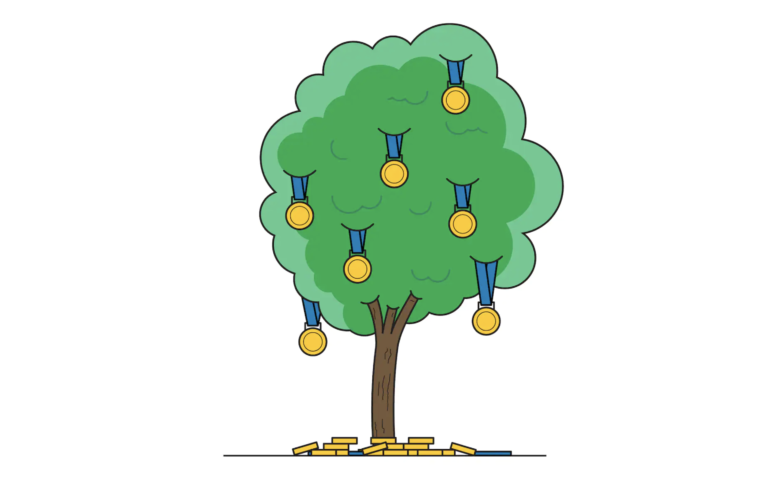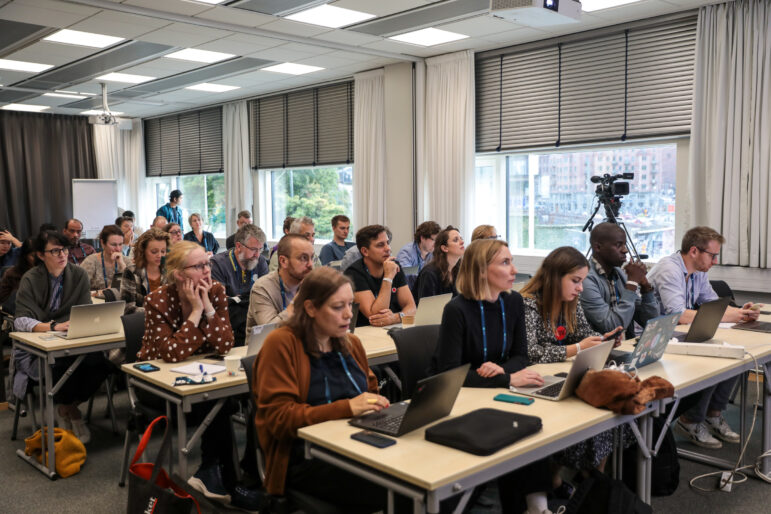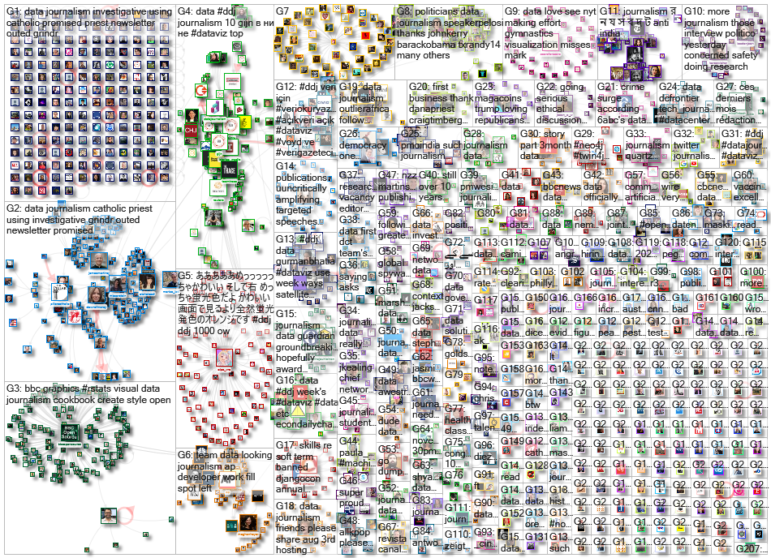

Data Journalism Top 10: Tokyo Olympics, Sand Mining, Elder Care, Russia’s Forests, TikTok’s Algorithm
Read this article in
After a year-long delay due to the COVID-19 pandemic, the 32nd Olympic Games have captured global attention. Despite the lack of crowds to watch the world’s best athletes, the competition has already delivered outstanding performances and inspiring narratives. Our NodeXL mapping from July 19 to 25, which tracks the most popular data journalism stories on Twitter each week, found imaginative, data-driven coverage of the Olympics by The Washington Post, The New York Times, and other major outlets. In this edition, we also feature a piece by Reuters Graphics on the decimation of a Chinese lake by sand mining, a look by Investigate Europe at elder care, and a deep dive into TikTok’s algorithm by The Wall Street Journal.
Who Dominates the Olympics
Throughout the course of the games, one might look at the overall dashboard to see which country has won the most medals. But these numbers don’t tell the whole story. Instead, The Washington Post examined a range of individual events — including basketball, judo, artistic swimming, and badminton — to paint a detailed picture of where nations are most likely to find success.
Deconstructing Elite Athletes
Great athletes often make their sports look quite simple. But don’t let their excellence deceive you. Behind every performance are tens of thousands of hours of practice and details difficult to spot by the casual viewer. Using video and data captured during training sessions, The New York Times focused on athletes in four sports — climbing, gymnastics, track-and-field, and swimming — to explain what makes each one’s technique special.
Decimated by Sand Mining
Poyang Lake, China’s largest body of freshwater, is a national nature reserve and a rest stop for over 300 species of migratory birds. But a surge in sand mining operations fueling the construction of China’s megacities has threatened the lake’s fragile ecosystem and caused a biodiversity crisis. Reuters analyzed satellite imagery and drone footage to create an in-depth visual tour of how sand mining has transformed large parts of the lake and its shoreline.
Spying on World Leaders
The fallout from the Pegasus Project revelations has again shifted global attention to the abuse of technology for mass surveillance and breaches of digital privacy. Along with journalists and activists, presidents and prime ministers have been affected by NSO Group’s spyware. The Organized Crime and Corruption Reporting Project (OCCRP) reported that 14 world leaders from Europe, Africa, Asia, and the Middle East appear to have been selected as potential targets.
Gray Gold
Elderly people in care homes were among those hit the hardest by the global pandemic. The health crisis has worsened the already dire state of facilities across Europe where residents and overworked caregivers exist in grueling conditions. Despite this flawed system, investors are making huge profits. A cross-border project by Investigate Europe and its partners examined the billion-euro business of elder care in 15 countries. The project found a range of problems and worrying developments.
Profiting from Deforestation
In Russian forests, thousands of hectares of healthy forests are being stripped of trees, leaving wasteland in their place. An investigation by Proekt into the country’s forestry business tells the story of a politician and entrepreneur who has been extracting lumber from the Siberian taiga in violation of standards, and selling it around the world, including to IKEA stores.
https://twitter.com/wwwproektmedia/status/1415554984997961731
Germany’s Next Chancellor
Angela Merkel is leaving office after 16 years and Germany will soon have a new chancellor. Three major parties — the Christian Democrats, the Social Democrats, and the Greens — have put up candidates hoping to succeed her. Deutsche Welle examined the candidates’ political positions and voting records to explain what each one’s election might mean for the future of Germany and Europe.
Inside TikTok’s Secretive Algorithm
Ever wondered how TikTok seems to know everything about you and your most intimate thoughts? If so, you’re not alone. Users on the social platform are consistently surprised by its ability to provide content surprisingly well tailored to their personalities. To investigate the platform’s algorithm, The Wall Street Journal created dozens of automated accounts. Reporters found that, for TikTok, the most important piece of information is the amount of time you spend watching a particular video.
Investigating Pension Payments
In theory, freedom of information laws should be one of the best ways for journalists to discover and collect information, opening the door for major investigations. But newsrooms often need to be extremely patient and persistent to get governments to release data. This is what happened in Brazil, where GIJN member Fiquem Sabendo managed to get 27 years of pension payments released — after a four-year struggle. Latin American Journalism Review looks at how the journalism agency won access to the database, which has led to publication of more than 70 stories.
Why Learn Data Journalism?
If you’re reading our weekly series, then you’re likely already a fan of data journalism. The popularity of this skill set has risen in recent years as newsrooms and reporters look to experiment and diversify their coverage. DataJournalism.com’s Andrea Abellán made a list of 10 good reasons why data reporting has become an essential part of the modern media. Reason number one: everything is data.
Thanks again to Marc Smith and Harald Meier of Connected Action for gathering the links and graphing them. The Top Ten #ddj list is curated weekly.
 Peter Georgiev is GIJN’s social media and engagement editor. Previously, he was part of NBC News’ investigative unit in New York. He also worked as a correspondent for Bulgarian National Television and his reporting has been published by the Guardian, Deutsche Welle, and other international outlets.
Peter Georgiev is GIJN’s social media and engagement editor. Previously, he was part of NBC News’ investigative unit in New York. He also worked as a correspondent for Bulgarian National Television and his reporting has been published by the Guardian, Deutsche Welle, and other international outlets.









